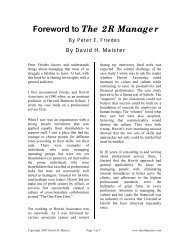pdf version - David Maister
pdf version - David Maister
pdf version - David Maister
Create successful ePaper yourself
Turn your PDF publications into a flip-book with our unique Google optimized e-Paper software.
Doing It For The Money<br />
much a waste of time, because it was<br />
the ones who weren’t interested that<br />
we were trying to reach.”<br />
“Anything else?”<br />
“Oh, yes. We designed a process for<br />
targeting our key clients with crossdiscipline<br />
teams and we gave people<br />
access to marketing staff specialists,<br />
laying out a program of how to make<br />
relationship building programs<br />
effective.”<br />
“And what happened?”<br />
“Well, where individual people or<br />
groups did what we planned, it<br />
worked fabulously. Some people<br />
always wanted to do this in an<br />
organized fashion. But many of our<br />
supposed teams never did execute<br />
the programs they had themselves<br />
submitted as plans.”<br />
“Why not?”<br />
“The same syndrome, I suppose.<br />
Tools, systems and organization are<br />
wonderful aids for people who<br />
already want to do this stuff, but they<br />
seem to have little impact on people<br />
who don’t want to. If the underlying<br />
problem is attitude, no amount of<br />
processes, forms and support is<br />
going to change things.”<br />
“So?”<br />
“Well, what do you think we ought<br />
to try next, <strong>David</strong>? What’s the latest<br />
thinking?<br />
First, Stop Doing What Doesn’t<br />
Work<br />
Notice the amazing range of things<br />
that firms have tried to get people<br />
involved in business development.<br />
Included in the preceding dialogue<br />
are references to:<br />
• Visions<br />
• Rewards<br />
• Punishments<br />
• Training<br />
• Processes<br />
• Support Resources<br />
• Restructuring of Teams<br />
And, I’m told, they haven’t worked as<br />
well as people hoped they would.<br />
There’s still a need to find a way to elicit<br />
enthusiastic participation in businessgetting.<br />
The primary reason most of these<br />
business development management<br />
initiatives tend to deliver poor results is<br />
exactly that word: a reason. Firms do not<br />
address the central question that those<br />
who do not participate have: “Why<br />
should I get involved in all this?”<br />
Firms keep trying to prove to people<br />
why their efforts would be good for the<br />
firm (“Do it for the glory of the<br />
institution; do it to achieve our strategic<br />
goals”) or because it will make them rich<br />
(“Don’t worry about whether this is<br />
interesting stuff—do it for the money!”)<br />
Not only are these appeals not always<br />
effective (if they were, I wouldn’t have<br />
been asked to write this article or to<br />
constantly speak about this subject) but,<br />
perhaps surprisingly, encouraging<br />
professionals to put effort into business<br />
development for the money turns out to<br />
backfire badly—less money is earned,<br />
not more.<br />
Copyright 2005 <strong>David</strong> H. <strong>Maister</strong> Page 2 of 7 www.davidmaister.com











